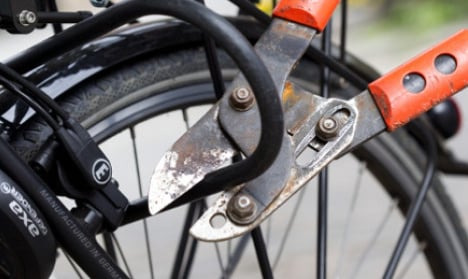With its ubiquitous cycle lanes and touring trails, Germany should be a cyclist's paradise. But the more popular cycling becomes, the more it attracts thieves to relatively easy pickings with only a slim chance of being apprehended.
"Objectively speaking, the chances of seeing your bike again are not good," admitted detective superintendent Oliver von Dobrowolski of the Berlin police, calling the capital's meagre four percent detection rate "distressing".
A total of 317,000 bicycles were reported stolen in 2013 in Germany of which only 9.6 percent were recovered, according to police statistics.
Many more bikes are also stolen but are not reported. On average, 70 bikes are reported stolen in Berlin each day, while the actual number is thought to be more than double that.
But Dobrowolski also placed much of the blame for the thefts on owners who don't use adequate locks or don’t get their bikes stamped with a security number to help retrieval.
"If you want to hang on to your property, then it's your duty to protect it," he said, adding that the police cannot be expected to keep an eye on everything. "That's not always desired in a free society,” he added.
Bikes chained up in front of schools and railways stations are the most likely to get stolen. And in Berlin, at least, your beloved bike is more likely to fall victim to "lone operators looking to make some fast money," said the detective.
Bike gangs
But while individual stolen bikes are sold on at flea markets and on the internet, specialized bike theft rings also target specific areas and specific models. Using bolt cutters to sever security chains, they often snatch several bikes in one swoop.
The head of the German Cyclists Association (ADFC), Eva-Maria Scheel, saw a group of men steal several bikes after cutting the locks and whisking them away in a van before anyone could react. Her own bike turned out to be among them, she told Berlin's RBB radio station.
Not that the theft risk seems to dent the bicycle's popularity. A survey commissioned by the government last year showed that the bicycle is Germany's most popular means of transport.
Most Germans (52 per cent) occasionally ride a bike, and 72 percent have access to one in the family, with an average of 2.4 bikes per household.
Prices are also steadily growing, with a new bike costing on average €658, making them a tempting target for thieves.
Car theft is easier to deal with, say police, since chassis and engine numbers and electronic coding of parts makes it easier to track them down.
But very few bike owners take the trouble to have the frame stamped with a number and logged.
According to the financial website geld.de, Magdeburg, Cottbus and Münster are the cities with the highest bike theft rates, at 1,600 thefts per 100,000 inhabitants.
"In many cases this is the work of organized rings whose customers are in eastern Europe," Beatrix Mertens of the Magdeburg police told the news agency dpa.
The proximity of the autobahn for a fast getaway made the city a prime location for targeted thefts, she said.
The top detection rates are posted in the Bavarian towns of Fürth und Erlangen, with 31 and 26 percent of cases solved.
Police say this is due to redoubled efforts against the thieves, including the establishment of a special bike theft working group and increased surveillance in theft hot spots.
But since there is often a whole network of people involved, from thieves to distributors, well-aimed efforts can multiply results.
"You have to penetrate this [network] and then you come across more and more culprits," said Peter Schnellinger from the police in Franconia, where Fürth and Erlangen are located.



 Please whitelist us to continue reading.
Please whitelist us to continue reading.
Member comments